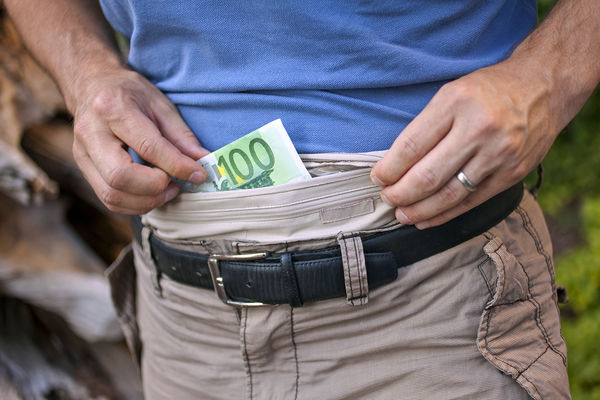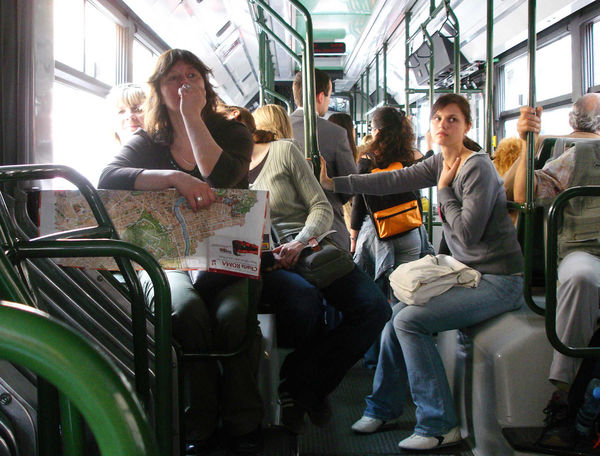Outsmarting Pickpockets and Thieves


By Rick Steves
While Europe has little violent crime, it does have its share of petty purse snatching, pickpocketing, phone grabbing, and general ripping off of tourists — especially in places where tourists gather. Thieves target vacationers — not because they're mean, but because they're smart. Travelers have all the good stuff in their bags and wallets. Loaded down with valuables, jetlagged, and bumbling around in a strange new environment, we stick out like jeweled thumbs. If I were a European street thief, I'd specialize in Americans — my card would say "Yanks R Us."
If you're not constantly on guard, you'll have something stolen. One summer, four out of five of my traveling companions lost cameras in one way or another. (Don't look at me.) But in more than 4,800 days of travel, I've been pickpocketed only once (on the Paris Métro, on a rare day I didn't wear my money belt) and mugged a single time (in a part of London where only fools and thieves tread). My various rental cars have been broken into a total of six times (broken locks, shattered windows, lots of nonessential stuff taken), and one car was hot-wired (and abandoned a few blocks away after the thief found nothing to take). Not one of my hotel rooms has ever been rifled through, and I simply don't let thoughts of petty crime — or the rare instance of it — spoil the fun of being abroad.
Many tourists get indignant when pickpocketed or ripped off. If it happens to you, it's best to get over it quickly. You're rich and thieves aren't. You let your guard down and they grabbed your camera. It ruins your day and you have to buy a new one, while they sell it for a week's wages on their scale. It's wise to keep a material loss in perspective.
There probably aren't more thieves in Europe than in the US. We just notice them more because they target tourists. But remember, nearly all crimes suffered by tourists are nonviolent and avoidable. Be aware of the possible pitfalls of traveling, but relax and have fun. Limit your vulnerability rather than your travels.
If you exercise adequate discretion, stay aware of your belongings, and avoid putting yourself into risky situations (such as unlit, deserted areas at night), your travels should be about as dangerous as hometown grocery shopping. Don't travel fearfully — travel carefully.
Here's some advice given to me by a thief who won the lotto.
Be prepared. Before you go, take steps to minimize your loss in case of theft. Make copies of key documents, and store them online. Consider getting theft insurance for expensive electronics. Leave your fancy bling at home. Luxurious luggage lures thieves. The thief chooses the most impressive suitcase in the pile — never mine.
Mobile payment technology reduces the need to handle your cards or cash; if you have a payment app such as Apple Pay, Google Pay, or PayPal on your phone, become familiar with it before your trip.
If your phone disappears, you're out not just the cost of the device — but also the photos and personal data stored on it. It's smart to take extra precautions before your trip: Make sure you've got a "find my phone"-type app, back up your data, and enable password protection. While traveling, use the Wi-Fi at your hotel to back up your phone and its photos each night. If you don't know how to sync your stuff to the cloud, learn before your trip.
Wear a money belt. A money belt is a small, zippered fabric pouch on an elastic strap that fastens around your waist. I almost never travel without one — it's where I put anything I really, really don't want to lose.
Leave valuables in your hotel room. Expensive gear, such as a laptop, is much safer in your room than with you in a day bag on the streets. While hotels often have safes in the room (or at the front desk), I've never bothered to use one, though many find them a source of great comfort. (Some travelers leave their passports secured in the room safe while out for the day. Locking valuables in your luggage is a good alternative if there's no safe.) Theft from hotel rooms happens, of course, but it's relatively rare — hoteliers are quick to squelch a pattern of theft. That said, don't tempt sticky-fingered staff by leaving a camera or tablet in plain view; tuck your enticing things well out of sight.
Secure your bag, gadgets, and other valuables when you're out and about. Thieves want to quickly separate you from your valuables, so even a minor obstacle can be an effective deterrent. If you're sitting down to eat or rest, loop your day pack strap around your arm, leg, or chair leg. If you plan to sleep on a train (or anywhere in public), clip or fasten your pack or suitcase to the seat, the luggage rack, or yourself. Most zippers are lockable, and even a twist-tie, paper clip, or key ring is helpful to keep your bag zipped up tight. The point isn't to make your bag impenetrable, but harder to get into than the next guy's.
Never set down valuable items — such as a camera, phone, wallet, or rail pass — on a train seat or restaurant table, where they are easy to swipe. Keep these tucked away. When using your phone at a crowded café, don't place it on the bar: Put it in your front pocket (then return it to a safer place before you leave).
Some thieves can even be so bold as to snatch something right out of your hands. Be aware of who's around you.
One way to minimize this risk is to keep valuable devices attached to you or your bag (this also reduces the chance of accidentally leaving something behind). For instance, a phone case/lanyard combo has a strap that you can loop around your chest or wrist, even when using your device. You can also use a lanyard to attach gadgets to your day pack (if there's no interior attachment point, feed straps through zipper pulls or a sturdy safety pin hooked to the inside of your bag).
Be discreet with your hiding places. If you're keeping valuables anywhere but a money belt or other secure pocket (I wouldn't), be as circumspect as possible. Thieves can identify the easiest mark — most likely the person with the bulging back pocket or the traveler who keeps patting a day bag to check that the money is still there.
Stay vigilant in crowds and steer clear of commotions. Go on instant alert anytime there's a commotion; it's likely a smokescreen for theft. Imaginative artful-dodger thief teams create a disturbance — a fight, a messy spill, or a jostle or stumble — to distract their victims. Crowds anywhere, but especially on public transit and at flea markets, provide bad guys with plenty of targets, opportunities, and easy escape routes.
Be on guard in train stations, especially upon arrival, when you may be overburdened by luggage and overwhelmed by a new location. A petite bump and a slight nudge getting off the Métro in Paris and…wallet gone. That's exactly what happened to me. Take turns watching the bags with your travel partner. Don't absentmindedly set down a bag while you wait in line; always be in physical contact with your stuff. If you check your luggage, keep the claim ticket or locker key in your money belt; thieves know just where to go if they snare one of these. On the train, tram, or subway, be hyper-alert at stops, when thieves can dash on and off with your bag.
City buses that cover tourist sights (such as Rome's notorious #64) are happy hunting grounds. Be careful on packed buses or subways; to keep from being easy pickings, some travelers wear their day bag against their chest (looping a strap around one shoulder). Some thieves lurk near subway turnstiles; as you go through, a thief might come right behind you, pick your pocket, and then run off, leaving you stuck behind the turnstile and unable to follow. By mentioning these scenarios, I don't want you to be paranoid…just prepared. If you keep alert, you'll keep your valuables, too.
Establish a "don't lose it" discipline. Travelers are more likely to inadvertently lose their belongings than to have them stolen. I've known people to leave passports under pillows, bags on the overhead rack on the bus, credit cards on café tables, and phones in the taxi. Always take a look behind you before leaving any place or form of transport. At hotels, stick to an unpacking routine, and don't put things in odd places in the room. Run through a mental checklist every time you pack up again: money belt, passport, phone, other electronic gear, charging cords, toiletries, laundry, and so on. Before leaving a hotel room for good, conduct a quick overall search — under the bed, under the pillows and bedspread, behind the bathroom door, in a wall socket…
Leave a clue for honest finders. Accidents happen, and even the most cautious traveler can leave something behind. Maximize your chances of getting it back by taping a tiny note with your email address or travel partner's phone number to any item you really don't want to lose, making it easy for a kind soul to return it. (For phones, you could use an "If Found, Please Return To" note as your lock screen, or tuck your business card inside the case.)
Use a Bluetooth tracker. If you're prone to leaving things behind, or just want to be extra careful, consider tucking an AirTag or other Bluetooth tracking device into your bag or attaching one to your phone.

